

Robin Williams. Nominated for the Academy Award for Best Actor three times, Williams went on to receive the Academy Award for Best Supporting Actor for his performance in Good Will Hunting (1997).
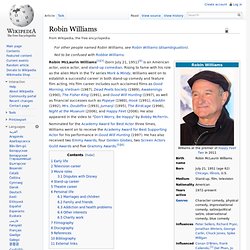
He has also received two Emmy Awards, four Golden Globes, two Screen Actors Guild Awards and five Grammy Awards.[5][6] Early life Williams has described himself as a quiet child whose first imitation was of his grandmother to his mother. He did not overcome his shyness until he became involved with his high-school drama department.[18] In 1973, Williams was one of only 20 students accepted into the freshman class at the Juilliard School, and one of only two students to be accepted by John Houseman into the Advanced Program at the school that year, the other being Christopher Reeve.[19] In his dialects class, Williams had no trouble mastering all dialects quickly.
Television career In February 2013, the CBS network announced it had picked up a pilot episode for a David E. Movie roles Disputes with Disney. Robin Willims - Golf (full version) Hook (film) Hook is a 1991 American fantasy adventure film directed by Steven Spielberg and written by James V.
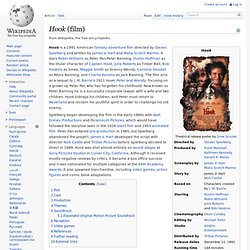
Hart and Malia Scotch Marmo. It stars Robin Williams as Peter Pan/Peter Banning, Dustin Hoffman as the titular character of Captain Hook, Julia Roberts as Tinker Bell, Bob Hoskins as Smee, Maggie Smith as Granny Wendy, Caroline Goodall as Moira Banning, and Charlie Korsmo as Jack Banning. The film acts as a sequel to J. M. Jonathan Winters. Jonathan Harshman Winters III (November 11, 1925 – April 11, 2013) was an American comedian, actor, author, and artist.
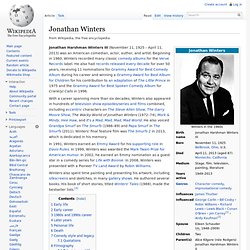
Beginning in 1960, Winters recorded many classic comedy albums for the Verve Records label. He also had records released every decade for over 50 years, receiving 11 nominations for Grammy Award for Best Comedy Album during his career and winning a Grammy Award for Best Album for Children for his contribution to an adaptation of The Little Prince in 1975 and the Grammy Award for Best Spoken Comedy Album for Crank(y) Calls in 1996.
Bill Cosby. Using the Fat Albert character developed during his stand-up routines, Cosby created, produced, and hosted the animated comedy television series Fat Albert and the Cosby Kids, a show that ran from 1972 to 1985, centering on a group of young friends growing up in an urban area.
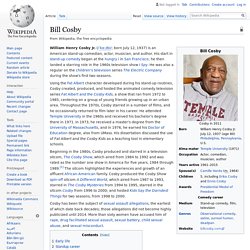
Throughout the 1970s, Cosby starred in a number of films, and he occasionally returned to film later in his career. He attended Temple University in the 1960s and received his bachelor's degree there in 1971. 200 M.P.H. 200 M.P.H. (1968) is the seventh stand-up comedy album by Bill Cosby, and his ninth album overall.
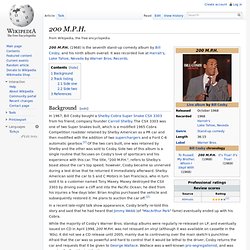
It was recorded live at Harrah's, Lake Tahoe, Nevada by Warner Bros. Records. Background[edit] In 1967, Bill Cosby bought a Shelby Cobra Super Snake CSX 3303 from his friend, company founder Carroll Shelby. The CSX 3303 was one of two Super Snakes built, which is a modified 1965 Cobra Competition roadster retained by Shelby American as a PR car and then modified with the addition of two superchargers and a Ford C-6 automatic gearbox.[2] Of the two cars built, one was retained by Shelby and the other was sold to Cosby. While the majority of Cosby's Warner Bros. standup albums were regularly re-released on LP, and eventually issued on CD in April 1998, 200 M.P.H. was not reissued on vinyl (although it was available on cassette in the '80s).
Track listing[edit] Bill Cosby 200MPH. Sam Kinison. Sam Kinison World Hunger. SAM KINISON IN BACK TO SCHOOL. Gallagher (comedian) Gallagher (born Leo Anthony Gallagher, Jr., on July 24, 1946) is an American comedian and prop comic, known for smashing watermelons as part of his act.
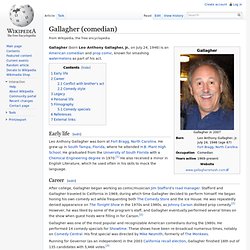
After college, Gallagher began working as comic/musician Jim Stafford's road manager. Stafford and Gallagher traveled to California in 1969, during which time Gallagher decided to perform himself. He began honing his own comedy act while frequenting both The Comedy Store and the Ice House. App Toys - iphone controlled paper airplane from PowerUp. How does it work?

See it in action! Image gallery PowerUp Toys has introduced a new form of play by meshing origami classics with technology. This time we took a big leap forward, by integrating state-of-the-art Bluetooth Smart technology into our PowerUp design. Now you can easily control a simple homemade paper airplane with your smartphone. Share this page.
Those Magnificent Men in their Flying Machines. Those Magnificent Men in their Flying Machines; Or, How I Flew from London to Paris in 25 Hours 11 Minutes is a 1965 British comedy film starring Stuart Whitman, Sarah Miles, Robert Morley, Terry-Thomas and James Fox, directed and co-written by Ken Annakin.
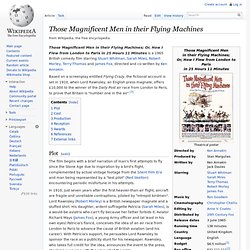
Based on a screenplay entitled Flying Crazy, the fictional account is set in 1910, when Lord Rawnsley, an English press magnate, offers £10,000 to the winner of the Daily Post air race from London to Paris, to prove that Britain is "number one in the air".[3] Plot[edit] The film begins with a brief narration of man's first attempts to fly since the Stone Age due to inspiration by a bird's flight, complemented by actual vintage footage from the Silent Film Era and man being represented by a "test pilot" (Red Skelton) encountering periodic misfortune in his attempts. The Great Race. The Great Race is a 1965 American slapstick comedy Technicolor film starring Jack Lemmon, Tony Curtis, and Natalie Wood, directed by Blake Edwards, written by Blake Edwards and Arthur A.
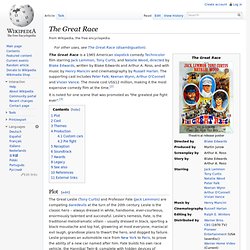
Ross, and with music by Henry Mancini and cinematography by Russell Harlan. The supporting cast includes Peter Falk, Keenan Wynn, Arthur O'Connell and Vivian Vance. The movie cost US$12 million, making it the most expensive comedy film at the time.[2] It is noted for one scene that was promoted as "the greatest pie fight ever".[3] Plot[edit] The Great Leslie (Tony Curtis) and Professor Fate (Jack Lemmon) are competing daredevils at the turn of the 20th century. James Garner. Early life[edit]
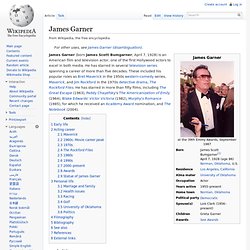
Maverick (film) The film received a favorably critical reception for its light-hearted charm, and was financially successful, earning over $180 million during its theatrical run. It received a nomination for an Academy Award for Best Costume Design (April Ferry). The story, set in the American Old West, is a first-person account by wisecracking gambler Bret Maverick (Mel Gibson), of his misadventures on the way to a major five-card draw poker tournament.
Besides wanting to win the tournament for the prize money, he also wants to prove, once and for all, that he is "the best". Maverick rides into the fictional town of Crystal River intending to collect money owed to him, as he is $3,000 short of the poker tournament entry fee of $25,000. Angel receives a mysterious telegram ordering him to not allow Maverick to reach the poker game. Three plot twists follow. Support Your Local Gunfighter. Plot[edit] Latigo Smith (Garner), a gambler and confidence man, is traveling by train in frontier-era Colorado with the rich and powerful Goldie (Marie Windsor). Goldie is besotted with Latigo and wants desperately to marry him, a fate that he wants no part of. He manages to slip off the train at Purgatory, a jerkwater mining town. Assessing the situation, he discovers that two rival companies of miners, led by Taylor Barton (Harry Morgan) and Colonel Ames (John Dehner), are racing each other to find a "mother lode" of gold buried somewhere nearby.
Massive dynamite blasts periodically rock the town to its foundations, creating or embellishing various moments of comic relief throughout the film. Grand Prix (1966 film) Grand Prix is a 1966 American action film with an international cast. The picture was directed by John Frankenheimer with music by Maurice Jarre and stars James Garner, Eva Marie Saint, Yves Montand, Brian Bedford, Jessica Walter and Antonio Sabàto. Toshiro Mifune has a supporting role as a race team owner, inspired by Soichiro Honda. The picture was photographed in Super Panavision 70 by Lionel Lindon, and presented in 70 mm Cinerama in premiere engagements. Its unique racing cinematography – in part credited to Saul Bass[2][3] – is one of the main draws of the film. Support Your Local Sheriff! Support Your Local Sheriff! Is a 1969 American comic western film which parodies the often-filmed scenario of an iconoclastic new arrival who tames a lawless frontier town.
Carroll Shelby. CRUSUE.